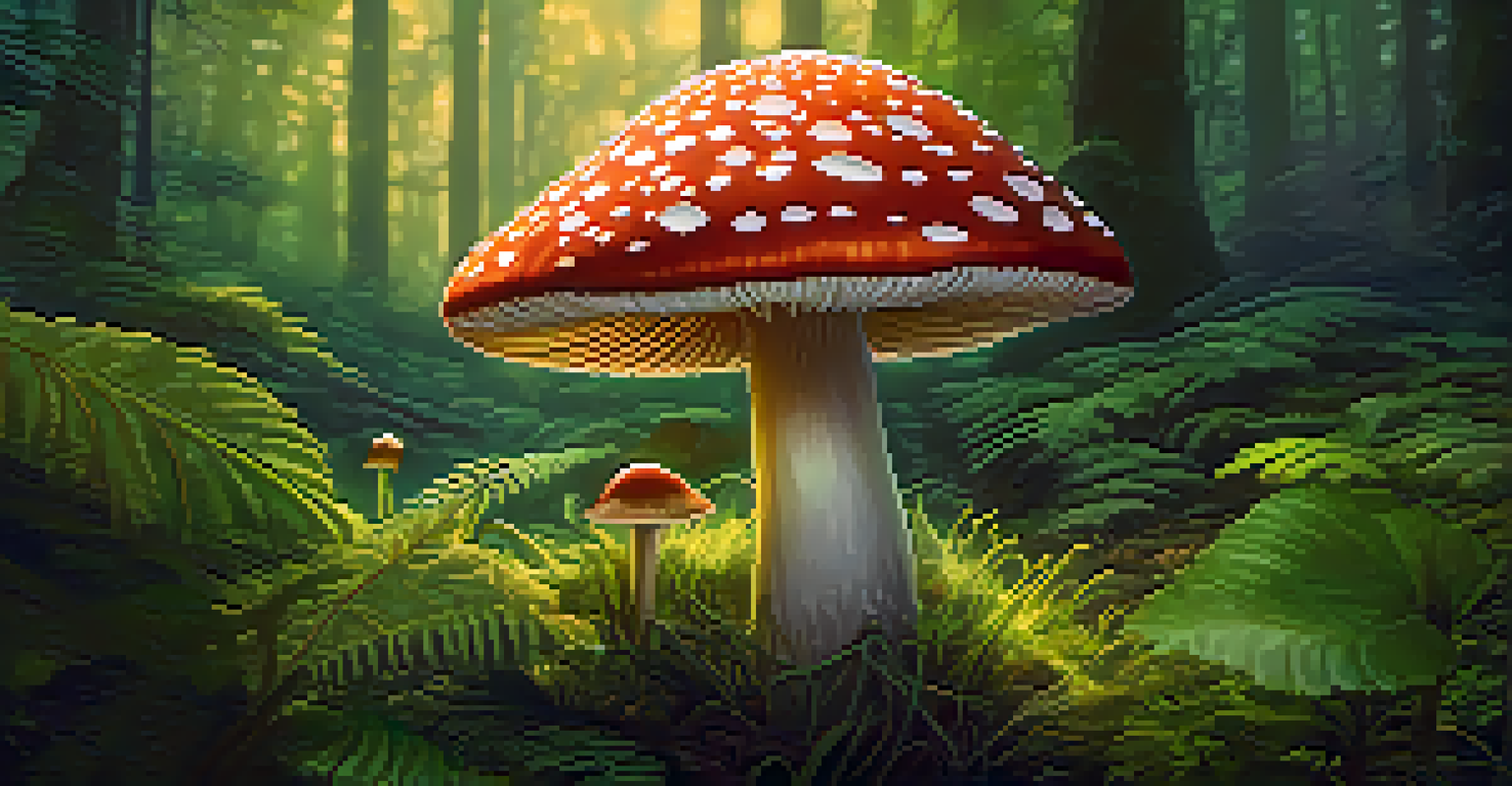The Relationship Between Entheogens and Environmentalism

Understanding Entheogens and Their Cultural Significance
Entheogens are substances that can induce altered states of consciousness, often used in spiritual or religious contexts. These natural compounds, such as psilocybin mushrooms and ayahuasca, have been a part of human culture for centuries. They hold deep significance in various indigenous practices, where they are viewed as a means to connect with the divine and the natural world.
The greatest threat to our planet is the belief that someone else will save it.
In many cultures, these substances are not merely tools for recreation; they are integral to rituals that emphasize the interconnectedness of life. By experiencing these altered states, individuals often report profound insights about nature and existence. This connection can lead to a greater appreciation for the environment, fostering a sense of responsibility towards its preservation.
As more people explore entheogens, there's an increasing interest in how these experiences translate into real-world actions. This cultural revival is prompting discussions about the role of spirituality in environmentalism and how altered states can enhance our understanding of ecological balance.
The Psychological Impact of Entheogens on Environmental Awareness
Research suggests that entheogens can significantly alter a person's perception of nature. Many individuals report feeling a deep sense of unity with their surroundings after using these substances, leading to what is often described as an 'ecstatic experience.' This feeling of oneness can inspire behavioral changes, such as increased environmental activism or sustainable living practices.

For example, studies have indicated that people who have undergone entheogenic experiences are more likely to engage in community efforts to combat climate change. They often develop a heightened sensitivity to ecological issues, recognizing the urgency of protecting our planet. This shift in perspective can trigger a ripple effect, encouraging others in their communities to prioritize environmental stewardship.
Entheogens Foster Environmental Unity
Experiences with entheogens can lead to a profound sense of connection with nature, inspiring individuals to engage in environmental activism.
Moreover, the psychological effects of these substances can foster empathy not only towards other humans but also towards non-human life forms. By cultivating a sense of connection to the earth, individuals may feel compelled to advocate for policies that protect biodiversity and ecosystems.
Historical Perspectives: Entheogens and Nature Conservation
Throughout history, many indigenous cultures have incorporated entheogens into their environmental practices. For instance, the use of peyote among Native American tribes is not only a spiritual journey but also a means of connecting with the land and its resources. These practices often include rituals that emphasize sustainability and respect for nature.
Nature does not hurry, yet everything is accomplished.
In these cultures, there’s a profound understanding that their survival is linked to the health of the environment. By integrating entheogenic experiences with conservation efforts, they can pass down knowledge that promotes ecological harmony. This model presents a valuable lesson for contemporary environmentalism, highlighting the importance of respecting traditional ecological knowledge.
As modern society grapples with ecological crises, revisiting these historical perspectives can offer fresh insights. Learning from indigenous practices can help bridge the gap between spirituality and environmental action, creating a more holistic approach to conservation.
Entheogens and the Rise of Eco-Spirituality
The intersection of entheogen use and environmentalism has given rise to what many are calling 'eco-spirituality.' This concept emphasizes the sacredness of nature and encourages individuals to find spiritual significance in the natural world. By integrating entheogenic experiences into their spiritual practices, people can deepen their connection to the earth.
Eco-spirituality often involves community gatherings that focus on both personal and collective healing through nature and entheogens. These events not only provide a space for individual transformation but also foster communal efforts towards environmental sustainability. Participants often leave with renewed commitment to protect the planet, viewing their actions as part of a larger spiritual mission.
Historical Insights on Conservation
Indigenous cultures have long integrated entheogens into their environmental practices, highlighting the importance of ecological harmony.
This movement is also gaining traction among various environmental organizations, as they recognize the power of spirituality in motivating action. By framing environmental stewardship as a sacred duty, eco-spirituality can inspire a broader audience to engage in conservation efforts.
Challenges and Controversies Surrounding Entheogen Use
While the benefits of entheogens in promoting environmental awareness are compelling, there are challenges and controversies that cannot be ignored. The legality of these substances varies greatly across different regions, which can hinder research and responsible use. Additionally, concerns about misuse and the commodification of these sacred plants can undermine their cultural significance.
Moreover, the potential for negative psychological effects must be considered. Not everyone responds positively to entheogens, and for some, these experiences can lead to distress or confusion. Ensuring that people have access to proper guidance and support is crucial in mitigating these risks.
Addressing these challenges requires a nuanced approach that respects cultural traditions while promoting safe and responsible practices. As society continues to explore the potential of entheogens, open dialogue and education will be key to navigating the complexities surrounding their use.
The Role of Modern Science in Studying Entheogens
Modern science is beginning to catch up with the ancient wisdom surrounding entheogens. Research institutions are conducting studies to explore the therapeutic and ecological benefits of these substances. This scientific inquiry not only validates the experiences of those who have used entheogens but also uncovers their potential role in addressing environmental issues.
For example, some studies focus on how entheogens can enhance creativity and problem-solving, which are essential skills in developing sustainable solutions. By understanding the neurobiological effects, researchers aim to unlock ways these substances can inspire innovative thinking in environmental conservation.
Eco-Spirituality and Community Action
The rise of eco-spirituality emphasizes the sacredness of nature, motivating communal efforts towards sustainability through entheogenic practices.
Furthermore, the integration of scientific research and traditional knowledge can lead to more comprehensive strategies for environmental protection. Collaboration between scientists and indigenous communities can foster a greater understanding of how entheogens can contribute to both mental health and ecological awareness.
Moving Forward: Entheogens as Catalysts for Environmental Action
As we look to the future, the relationship between entheogens and environmentalism presents an opportunity for meaningful change. By embracing these substances as tools for personal and collective transformation, we can cultivate a deeper respect for the planet. This shift in mindset can inspire a new generation of environmental advocates who view nature through a spiritual lens.
Educational initiatives that focus on the ecological benefits of entheogens can help demystify these substances and promote responsible usage. By sharing knowledge and experiences, communities can build a foundation for collaborative environmental action that draws from both science and spirituality.

Ultimately, the journey towards ecological sustainability is a shared responsibility. By recognizing the potential of entheogens to enhance our connection to the earth, we can work together to create a more harmonious relationship with the natural world.